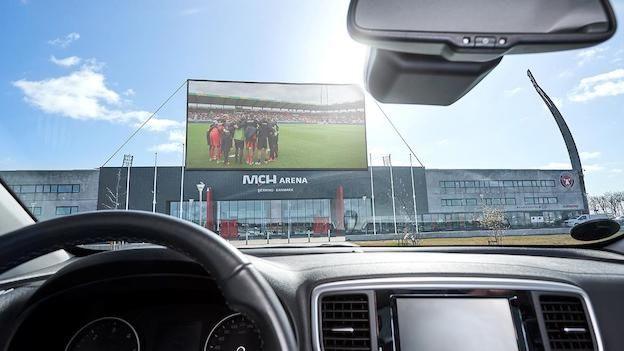Coronavirus and sport: Danish club plan football drive-in
- Published

'Parking the bus' is a term for very defensive football - FC Midtjylland are offering their fans the chance to park their cars and watch the game
When football is being played behind closed doors, being on the other side of that door is the next best thing, right?
Danish Superliga leaders FC Midtjylland think so.
So much so, that when the league eventually resumes with games being played in empty stadiums, they have come up with an ingenious idea to ensure their fans are as close as possible to the action - while also remaining at a safe distance.
A drive-in.
The club plans to set up two big screens in their stadium car-park, with up to 2,000 parking spaces being made available.
It would allow up to 10,000 fans to tune into the TV commentary through their car radio.
Live footage of the car-park will then be screened inside the MCH Arena to enable players to feel the fans’ presence.
"We are working hard to create the best possible experience," said Preben Rokkjaer, the club’s marketing director.
He explained the cub want to "give something back to the region and our many loyal fans".
"We have a stated goal of creating the best stadium experience. Coronavirus does not change that, it just provides some other preconditions," he added.
Of course, such plans need to incorporate every eventuality. What if, say, nature calls?
“You have to flash the lights, then a guard will come and pick you up and make sure the toilet is cleaned afterwards,” Rokkjaer told Danish newspaper BT, external.
He added that there will be prizes for the car dressed best in club colours, while away fans will be parked in a separate section.
The Superliga is currently planning to restart on 17 May with the season finishing by the end of July.
It comes after Denmark’s Prime Minister Mette Frederiksen announced on Friday that the country would start lifting restrictions while still enforcing social distancing rules.
Schools re-opened last week while beauty salons, hairdresser and dentists will resume business from Monday.
More than 350 people have died after contracting coronavirus in Denmark, and the country has had more than 7,300 confirmed cases.